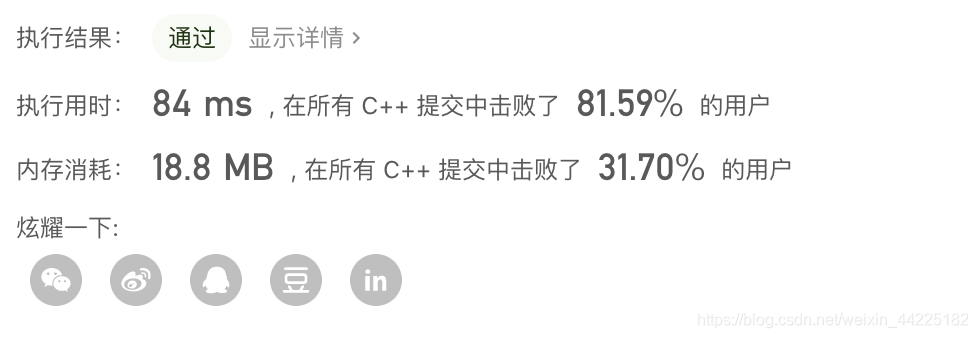LeetCode刷题(150)~子矩形查询
【摘要】 题目描述
请你实现一个类 SubrectangleQueries ,它的构造函数的参数是一个 rows x cols 的矩形(这里用整数矩阵表示),并支持以下两种操作:
updateSubrectangle(int row1, int col1, int row2, int col2, int newValue)
用 newValue 更新以 (row1,col1...
题目描述
请你实现一个类 SubrectangleQueries ,它的构造函数的参数是一个 rows x cols 的矩形(这里用整数矩阵表示),并支持以下两种操作:
- updateSubrectangle(int row1, int col1, int row2, int col2, int newValue)
用 newValue 更新以 (row1,col1) 为左上角且以 (row2,col2) 为右下角的子矩形。
2. getValue(int row, int col)
返回矩形中坐标 (row,col) 的当前值。
示例 1:
输入:
["SubrectangleQueries","getValue","updateSubrectangle","getValue","getValue","updateSubrectangle","getValue","getValue"]
[[[[1,2,1],[4,3,4],[3,2,1],[1,1,1]]],[0,2],[0,0,3,2,5],[0,2],[3,1],[3,0,3,2,10],[3,1],[0,2]]
输出:
[null,1,null,5,5,null,10,5]
解释:
SubrectangleQueries subrectangleQueries = new SubrectangleQueries([[1,2,1],[4,3,4],[3,2,1],[1,1,1]]);
// 初始的 (4x3) 矩形如下:
// 1 2 1
// 4 3 4
// 3 2 1
// 1 1 1
subrectangleQueries.getValue(0, 2); // 返回 1
subrectangleQueries.updateSubrectangle(0, 0, 3, 2, 5);
// 此次更新后矩形变为:
// 5 5 5
// 5 5 5
// 5 5 5
// 5 5 5
subrectangleQueries.getValue(0, 2); // 返回 5
subrectangleQueries.getValue(3, 1); // 返回 5
subrectangleQueries.updateSubrectangle(3, 0, 3, 2, 10);
// 此次更新后矩形变为:
// 5 5 5
// 5 5 5
// 5 5 5
// 10 10 10
subrectangleQueries.getValue(3, 1); // 返回 10
subrectangleQueries.getValue(0, 2); // 返回 5
- 1
- 2
- 3
- 4
- 5
- 6
- 7
- 8
- 9
- 10
- 11
- 12
- 13
- 14
- 15
- 16
- 17
- 18
- 19
- 20
- 21
- 22
- 23
- 24
- 25
- 26
- 27
- 28
- 29
示例 2:
输入:
["SubrectangleQueries","getValue","updateSubrectangle","getValue","getValue","updateSubrectangle","getValue"]
[[[[1,1,1],[2,2,2],[3,3,3]]],[0,0],[0,0,2,2,100],[0,0],[2,2],[1,1,2,2,20],[2,2]]
输出:
[null,1,null,100,100,null,20]
解释:
SubrectangleQueries subrectangleQueries = new SubrectangleQueries([[1,1,1],[2,2,2],[3,3,3]]);
subrectangleQueries.getValue(0, 0); // 返回 1
subrectangleQueries.updateSubrectangle(0, 0, 2, 2, 100);
subrectangleQueries.getValue(0, 0); // 返回 100
subrectangleQueries.getValue(2, 2); // 返回 100
subrectangleQueries.updateSubrectangle(1, 1, 2, 2, 20);
subrectangleQueries.getValue(2, 2); // 返回 20
- 1
- 2
- 3
- 4
- 5
- 6
- 7
- 8
- 9
- 10
- 11
- 12
- 13
提示:
- 最多有 500 次updateSubrectangle 和 getValue 操作。
- 1 <= rows, cols <= 100
- rows == rectangle.length
- cols == rectangle[i].length
- 0 <= row1 <= row2 < rows
- 0 <= col1 <= col2 < cols
- 1 <= newValue, rectangle[i][j] <= 10^9
- 0 <= row < rows
- 0 <= col < cols
解答 By 海轰
提交代码
class SubrectangleQueries {
public: vector<vector<int> > rectangle; SubrectangleQueries(vector<vector<int>>& rectanglex) { rectangle=rectanglex; } void updateSubrectangle(int row1, int col1, int row2, int col2, int newValue) { for(int i=row1;i<=row2;++i) { for(int j=col1;j<=col2;++j) rectangle[i][j]=newValue; } } int getValue(int row, int col) { return rectangle[row][col]; }
};
- 1
- 2
- 3
- 4
- 5
- 6
- 7
- 8
- 9
- 10
- 11
- 12
- 13
- 14
- 15
- 16
- 17
- 18
- 19
运行结果

提交代码
// 思路:对于每一个的更新矩阵中的数字,其实是可以不用对原来对矩阵进行实际对更新
// 我们可以利用一个history二维数组,记录下每一个对更新
// 在获取某个坐标对值时,我们只需要对history 逆序,只要寻找对row,col在row1 col1
// row2 col2 形成对小矩形中,那么就直接返回记录中对value即可
// 这样可以避免对原来矩阵元素对改变
class SubrectangleQueries {
public: vector<vector<int> > rectangle; vector<vector<int> > history; SubrectangleQueries(vector<vector<int>>& rectanglex) { rectangle=rectanglex; } void updateSubrectangle(int row1, int col1, int row2, int col2, int newValue) { history.push_back({row1,col1,row2,col2,newValue}); } int getValue(int row, int col) { for(int i=history.size()-1;i>=0;--i) { if(history[i][0]<=row&&row<=history[i][2]&&history[i][1]<=col&&col<=history[i][3]) return history[i][4]; } return rectangle[row][col]; }
};
- 1
- 2
- 3
- 4
- 5
- 6
- 7
- 8
- 9
- 10
- 11
- 12
- 13
- 14
- 15
- 16
- 17
- 18
- 19
- 20
- 21
- 22
- 23
- 24
- 25
- 26
运行结果

题目来源
来源:力扣(LeetCode)
链接:https://leetcode-cn.com/problems/subrectangle-queries
文章来源: haihong.blog.csdn.net,作者:海轰Pro,版权归原作者所有,如需转载,请联系作者。
原文链接:haihong.blog.csdn.net/article/details/108549293
【版权声明】本文为华为云社区用户转载文章,如果您发现本社区中有涉嫌抄袭的内容,欢迎发送邮件进行举报,并提供相关证据,一经查实,本社区将立刻删除涉嫌侵权内容,举报邮箱:
cloudbbs@huaweicloud.com
- 点赞
- 收藏
- 关注作者


评论(0)